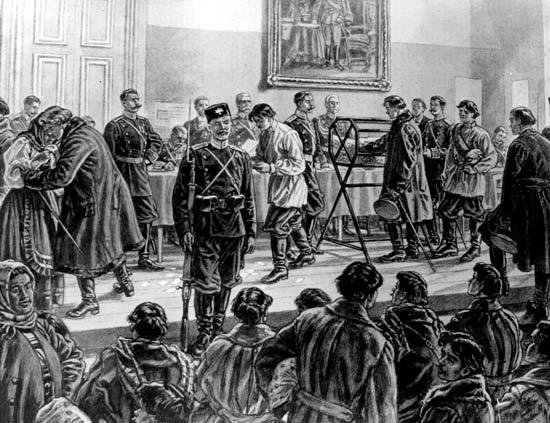
Conscription of individuals for civil or military service has been practiced since the dawn of statism, and has expanded to include almost all men since the French Revolution. The practice goes by many names: levying, impressment, national service, call-up, and the draft, to name a few. Though many states no longer use it, relying instead upon professional soldiers that enlist voluntarily, most claim a right to resume conscription if they cannot preserve themselves or achieve their foreign policy goals otherwise. This policy is controversial on religious, political, and philosophical grounds. Libertarians object to conscription as a violation of self-ownership, the root of all libertarian philosophy. As Ayn Rand explains,
“It negates man's fundamental right—the right to life—and establishes the fundamental principle of statism: that a man's life belongs to the state, and the state may claim it by compelling him to sacrifice it in battle.”[1]
According to Ron Paul,
“Conscription is wrongly associated with patriotism, when it really represents slavery and involuntary servitude.”[2]
The philosophical libertarian case against conscription is beyond reproach, but the perverse nature of statist systems of governance can make almost any deontologically indefensible policy into a useful strategy for libertarians. Let us see how conscription can backfire on the states that make use of it, and thus why one might agree with statists for the wrong reasons.
By forcing people to engage in an activity, the state provokes feelings of resentment and rebellion. With regard to conscription, this has a variety of effects that undermine the state. First, conscription fuels anti-war movements. Look at the unrest in America during the Vietnam War. Resistance to the draft played a major part in the protest movement, as people burned draft cards, evaded conscription by fleeing to Canada, and attacked draft board offices.[3] Similar examples go all the way back to the time of Hammurabi (r. 1791–1750 BC), when people avoided ilkum (the ancient Babylonian conscription system) by hiring substitutes to fight in their stead, leaving town, or selling property that had ilkum obligations attached to its ownership. These behaviors were outlawed by the Code of Hammurabi, but were widely practiced regardless.[4]
Read the entire article at ZerothPosition.com
References:
- Rand, Ayn (1967). Capitalism: The Unknown Ideal. Signet. p. 226.
- Paul, Ron (2003, Jan. 14). “Conscription Is Slavery”. Antiwar.com
- Zinn, Howard (2003). A People’s History of the United States. HarperCollins Publishers. p. 483–501.
- Postgate, J.N. (1992). Early Mesopotamia Society and Economy at the Dawn of History. Routledge. p. 242–43.
- McGregor, Andrew James (2006). A Military History of Modern Egypt: From the Ottoman Conquest to the Ramadan War. Greenwood Publishing Group. p. 15.